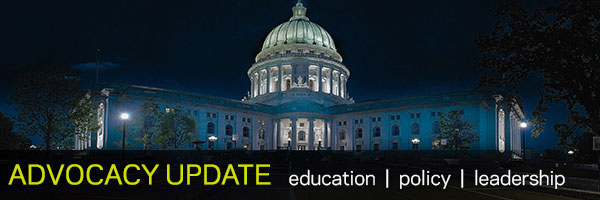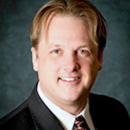|
|
|
|

The Big News
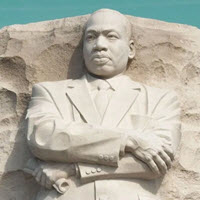
The Dr. Martin Luther King, Jr. memorial in Washington, D.C., includes this profound quote: “Out of a mountain of despair, a stone of hope.” From his famous “I Have a Dream” speech, it’s a powerful reminder that hope emerges from despair. King, a civil rights hero and icon, embodied that truth and will forever inspire activists of all kinds, including recovery advocates who have emerged from the despair of addiction to carry hope to others. On this Martin Luther King Jr. Day, we reflect gratefully on King’s far-reaching influence but also on the imperative we all share to lift up and make more space for the recovery voices of black Americans and to work together more vigorously on reducing disparities in care, access to recovery, and political action—for the sake of people like David Lunn, Jr.
Another occasion for reflection: Friday marked the 100th anniversary of the start of America’s 13-year experiment with alcohol Prohibition. Here are some interesting tidbits about that era:
-
Prohibition was years in the making, coming on the heels of a 100-year Temperance movement, whose foe—according to one historian, “wasn’t the drink in the bottle or the drunk who drank it, but the drink traffic: powerful business interests—protected by a government reliant on liquor taxes—getting men addicted to booze, and then profiting handsomely by bleeding them and their families dry.”
-
Thirty-two of the 48 states were already “dry” by the time federal Prohibition began, with Kansas having outlawed alcohol earliest—in 1881.
-
When federal Prohibition began, the entire nation had already spent a half-year under the Wartime Prohibition Act.
-
Several counties and communities today remain “dry.” For example, our own Emily Piper spent the weekend in Tennessee, where seven counties still forbid the sale of alcohol.
-
During Prohibition—other issues notwithstanding—the U.S. experienced reductions in the amount of liquor consumed, cirrhosis death rates, admissions to state mental hospitals for alcoholic psychosis, arrests for public drunkenness, and rates of absenteeism.
-
Marijuana was legal during Prohibition. But four years after Prohibition ended in 1933, marijuana was declared illegal.
Today, drinking-related deaths have climbed back to pre-Prohibition levels and a new sort of temperance—the sober socializing movement—is simultaneously gaining traction. So far, we haven’t seen much new on the alcohol policy front, but discussions may be emerging.
One also can’t help but compare and contrast marijuana prohibition with alcohol prohibition. Some like to refer to all prohibition policies as failed. But of course, when it comes to addictive substances, the legal ones—alcohol and tobacco—are responsible for far more public health problems than illegal substances, presumably because they are far more accessible and socially acceptable. As noted, alcohol prohibition also had some public health benefits. The unique issue there, though, was that alcohol was deeply embedded in the culture and had been for 130 years. Taking it away proved culturally untenable and gave rise to all sorts of social problems that ultimately loomed larger than
the public health benefits. When other substances were made illegal—including marijuana in 1937—it was not so controversial. As a result, keeping most substances illegal has not been untenable in the same way that making alcohol illegal was. Indeed, alcohol has been an outlier since the day Europeans arrived on the continent in booze-filled ships; public-health-focused policies have always been a challenge. When it comes to other substances, however, we are able to consider the full nuance of our policies and, ideally, hone them to promote the greatest public health with the least social cost. That’s how we come to our position supporting marijuana decriminalization (to limit social costs) but opposing full legalization and
commercialization (to promote public health).
Switching gears to Washington, U.S. Senate and House members have introduced new legislation—the Family Support Services for Addiction Act—that would create a $25 million grant program over five years to help national and local nonprofit organizations provide family support services for addiction treatment. You can support it
here.
A Congressional committee heard last week that rising meth deaths may represent a fourth wave of the opioid crisis. But are opioid use and meth use really related? Or is the growing meth problem better described as the next chapter in the national addiction crisis?
The House Energy & Commerce Health Subcommittee also held a big hearing on marijuana, discussing six bills aimed at expanding cannabis-related research. Lawmakers also heard about the need for more and better education for health care providers. Watch the hearing here.
Finally, it was nice to see the openness of an Arizona Congresswoman, who says she is getting professional help for alcohol use disorder: “I am finally seeking this help after struggling to do so in the past, and I am ready to admit that I, like countless other Americans, suffer from this disease. Hard work and determination — which have brought me success in life — have not been enough to win this battle.”
This week’s featured media is a video of our good friend Tommy Rosen discussing with great care, “The Great Debate Over Twelve Step Programs,” in response to a recent wave of online dialogue about the topic.
Share: Tweet | Facebook | LinkedIn
|
Treatment Industry Issues and Reforms
A Missouri advocate whose reform agenda has included arguing for new funding to support medication-assisted treatment in primary care settings and against new funding for specialty addiction treatment providers was fired from his consultant role with the state. His boss said, “There comes a time when, with really smart advocates like Ned, it needs to be decided where they will be most effective with their advocacy — inside a system or outside of it.” Learn more →
In California, the patient-brokering ban passed in 2018 applies only to licensed addiction treatment providers. State Sen. Pat Bates wants to extend it to sober home operators, too, but the Senate Health Committee rejected her bill last week. Opponents successfully argued that it would violate the Americans with Disabilities Act to apply a housing restriction to people with addiction but not to others. Senator Bates says that argument contradicts the spirit and intent of the ADA, and she vowed to bring back a fine-tuned proposal.
Meanwhile, five people were arrested in California last week and accused of preying on vulnerable patients in an alleged $3.2 million sober-home insurance-fraud scheme.
Defrauding insurance companies with unnecessary urine drug tests became a cash cow. But cops are starting to catch up.
Addiction medicine fellowships are key to expanding addiction-and-recovery expertise among doctors and throughout health care, so every new fellowship is good news. Kudos to our friend Dr. Fred Rottnek at St. Louis University, who just started the first fellowship in Missouri.
Do you know any medical students looking to learn more about addiction and recovery? We are offering 195 full scholarships to our 2020 Summer Institute for Medical Students, a five-day intensive immersion experience. Every summer, medical students from around the country come to Hazelden Betty Ford facilities to learn about the science of addiction; they leave knowing the spirit of recovery. The deadline for priority consideration this year is Feb. 1, and the final deadline is March 1. Learn more and apply, or please pass it on.
A financial blogger looks at the cost of addiction treatment through the lens of personal experience.
|
Cannabis
Good to see marijuana legalization is not on the Senate majority agenda in Minnesota and that voters won’t be deciding the issue in Florida this year either. At the same time, governors in four Northeast states say they may want to collaborate on renewed legalization efforts. Learn more →
One in six vaping lung illnesses is now linked to legally purchased THC, according to federal data. There have now been almost 2,700 hospital cases of lung injury linked to vaping.
New research identifies how marijuana accelerates growth of HPV-related head and neck cancer.
The first cannabis startup to raise big money in Silicon Valley is almost out of cash.
A recently published report describes the death of a newborn due to acute marijuana toxicity and highlights the need for more research on the impact of marijuana use on pregnancy outcomes.
The risk for schizophrenia following substance-induced psychosis is about 11%, with the strongest association among vulnerable users of marijuana, according to a study in the American Journal of Psychiatry.
A Nevada whistleblower turned to the FBI to detail “how regulators deleted disciplinary records of dispensary sales to minors ... favored certain establishments, and stored undocumented, unsecured and unknown quantities of seized marijuana in a state office.”
We have long known that marijuana impairment lasts longer than the high, and a new study supports that further, finding that heavy marijuana users who started young drive differently—even while not stoned.
Legal pot in Chicago costs almost twice as much as pot bought from street dealers.
|
Opioids
With two additional years of DEA data now available, it appears more than 100 billion doses of oxycodone and hydrocodone flooded the U.S. over the nine-year period of 2006 to 2014. A truly jaw-dropping total. Learn more →
How does a town like Portsmouth, Ohio, escape being known for opioids?
While most of the nation’s opioid litigation remains in progress, Oklahoma pursued its own course early on. It is now entitled to $829 million from settlements with drug companies and court orders. Here’s where the money is going.
Guardians caring for hundreds of thousands of children born dependent on opioids since 2000 are seeking to join together in a class-action lawsuit.
The Washington Post says Congress needs to pass a broad fentanyl ban.
A Congressional committee is reopening investigations into these three pharma companies: Purdue Pharma, Mallinckrodt Pharmaceuticals and Insys Therapeutics.
|
Alcohol
An acclaimed scientist says he's found relief from alcohol use disorder following brain surgery. Learn more →
LSU is No.1 in football … and drinking beer.
Can heavy drinking contribute to lung cancer? This study suggests it could.
Here’s another benefit of even a short break in alcohol consumption.
America’s love affair with wine may be waning.
The party (almost) never ends at the Ottawa International Airport.
You can now buy spreadable gin & tonic marmalade. But why?
|
Health Care Reform and Parity
Expanding Medicaid rolls under the Affordable Care Act may have saved more than 8,100 people from fatal opioid overdoses, a new study suggests. Learn more →
It turns out the Affordable Care Act’s insurance market has not been materially affected by the elimination of the individual mandate penalty.
|
 |
Advocate Spotlight
Watch last week’s Mental Health for US forum, which included a panel moderated by recovery advocate Ryan Hampton, with panelists that included Ross Szabo (pictured), wellness director for Geffen Academy at UCLA; Dr. Chris Miller, President and CEO of Mental Health America of Los Angeles; and USC student Lianna Treitler. Learn More →
|
MyPillow® founder and CEO Mike Lindell discussed his new memoir, What Are the Odds?, Sunday on WCCO-TV. Proceeds of the Minnesotan’s book, which chronicles his path from addiction to CEO, will help fund the launch of the Lindell Recovery Network, a planned online platform envisioned as a way for people struggling with addiction to connect to faith-based treatment centers and
mentors.
Freddy Shegog makes a strong case for collegiate recovery by describing what it meant to him.
|
Miscellaneous Musings
An advocate writes about ending the stigma facing astronauts who have addiction. Learn more →
- We are excited that Quyen Ngo has joined Hazelden Betty Ford as the new head of our Butler Center for Research.
- This ‘Breaking Bad’-themed science event is raising some questions about appropriateness.
- Our colleagues Jim Cowser and Dr. Steve Delisi will speak at the West Virginia Association of Alcoholism and Drug Abuse Counselors’ Advocacy Day event January 30 at the state capitol in Charleston.
- Our own William C. Moyers and others shared wonderful reflections about the late addiction treatment pioneer Gordy Grimm in weekend features by MinnPost and the Star Tribune.
- The Awareness Hour is back! The free speaker series that began in the recovery advocacy heyday of 1976 launched a new season on Jan. 4, with a presentation by Edward T. Lacy, MA, on “Recovery and the Buddha” and a special tribute to longtime recovery and Awareness Hour champion Art Mattox, who passed away last year. A collaboration between the Betty Ford Center in Rancho Mirage and Eisenhower Medical Center, the Awareness Hour will continue its 2020 run on Feb. 15 with internationally recognized interventionist, clinician and author
Louise Stanger presenting, “What's a Family to Do?”
- Since the American Bar Association launched its Well-Being Pledge in September 2018, almost 170 law firms, corporate law departments, law schools and government agencies have taken the pledge. The initiative was a response to our groundbreaking 2016 study with the ABA on mental health and substance use issues in the legal profession.
- Learn all about the growing mutual-help organization, SMART Recovery.
- William White remains on a break from his blog, so this week we share a new video with his most recent reflections on addiction treatment, bringing care to the streets, recovery research and recovery advocacy. It’s part of a “Pioneers of Recovery Oral History” project that started just a few months ago and already includes 34 videos.
- Thank you for reading. What do you think? Send us a note anytime, and have a great week!
|
Photo Highlights
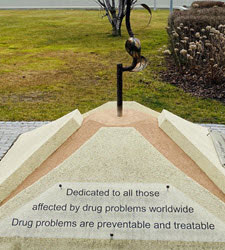 |
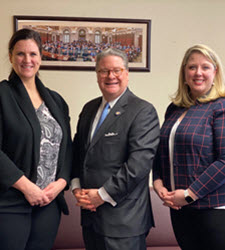 |
|
Our friend, recovery researcher John Kelly, PhD, tweets: “Noticed this dedicated monument outside the UN building in Vienna, Austria this morning. Inspiring and hopeful that the world attitude is shifting towards public health approaches.”
|
Our own Emily Piper (left) and Hazelden Betty Ford General Counsel Jennifer Lohse (right) visited Sen. Pete Harckham and other policymakers at the state capitol in Albany, New York, last week.
|
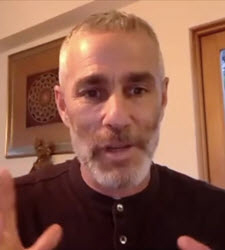 |
 |
|
In a new video, Recovery 2.0 founder Tommy Rosen addresses “The Great Debate Over Twelve Step Programs.”
|
Dr. Quyen Ngo, formerly at the University of Michigan, is the new executive director of Hazelden Betty Ford’s Butler Center for Research.
|
 |
 |
|
Our colleagues Dawne Carlson (left) and Joseph Skrajewski welcomed two family medicine residents for an immersive educational experience at the Betty Ford Center last week.
|
Business leader and recovery advocate Mike Lindell is promoting his new memoir—What Are the Odds?—and planning to launch a new faith-based online recovery network.
|
|
Please share questions, thoughts and ideas. Plus, follow us on Twitter for daily updates.
|
|
|
